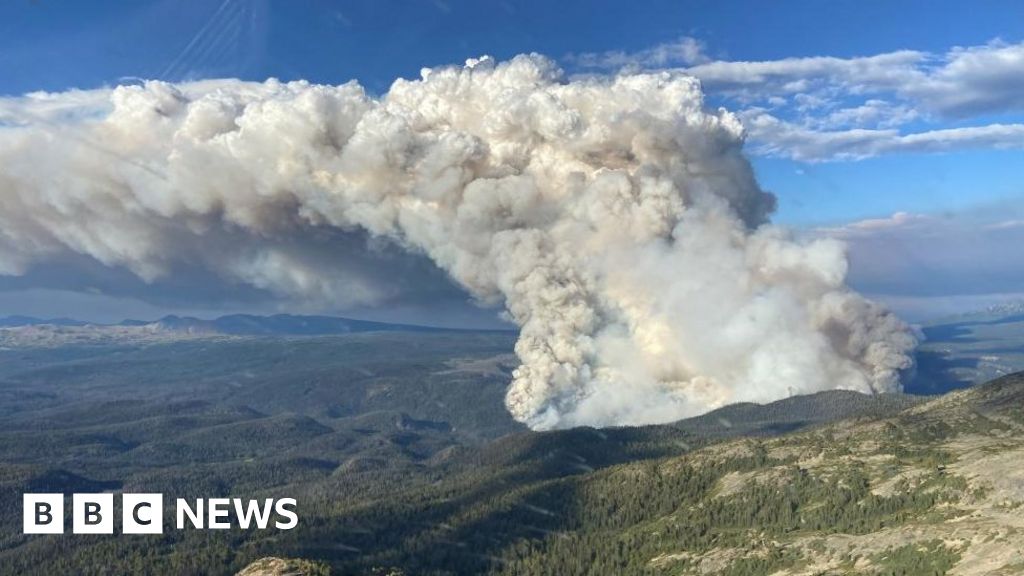A wildfire in Tweedsmuir Provincial Park, British Columbia continues to burn across Canada.
Air quality is rapidly declining in the northern and eastern United States as hundreds of wildfires across Canada spiral out of control.
Twenty US states were under air alert on Monday, according to AirNow, the government website that monitors harmful air pollutants. Major Canadian cities are also affected.
Meanwhile, Canada has deployed federal forces to fight new wildfires in western Canada.
Two Canadian firefighters died fighting the blaze.
Alerts across the United States stretch from Montana in the west to New York in the east and south to Alabama.
Health officials across Canada have also warned of a medium to high risk of smog in cities across the country, including Calgary, Montreal, Quebec City and Toronto.
New York officials warned people to stay indoors Monday, but said conditions won’t be as bad as they were when wildfires turned the state’s skies orange last month.
Residents of the Midwestern states of Illinois, Michigan and Wisconsin are also advised to limit the time they spend outdoors.
The Air Quality Index ranks 150 in many cities, indicating air quality considered “unhealthy for everyone”.
According to the IQAir tracking website, areas with an IQA above 150 on Monday afternoon included parts of Ohio, North Carolina, New Jersey, Maryland, Alabama and Pennsylvania.
Smoke is expected to start rising along the eastern seaboard on Tuesday, but not before intensifying in the northern state of Maine and parts of the south, including Atlanta, U.S. officials said.
About 900 fires are currently raging across Canada, according to the Canadian Interagency Wildfire Center. On Monday, the agency said 590 fires were out of control.
On Sunday, authorities announced that a second Canadian firefighter had died on duty.
“We are saddened to share the sad news that a Fort Liard firefighter died from injuries sustained while battling a wildfire in the Fort Liard District on Saturday afternoon,” Canada’s Northwest Territories said in a statement.
On Thursday, a 19-year-old firefighter died while working near Revelstoke in southern British Columbia.
British Columbia health officials said on Monday the death of a nine-year-old boy with asthma may be linked to smoke from a wildfire.
“The sudden and unexpected death of this boy is a painful loss for his family and his community,” said BC, which is investigating the boy’s death.
Much of the smoke affecting North America this week is in western Canada – British Columbia, Alberta and the Northwest Territories – unlike last month’s fires in Quebec.
Canada had its worst wildfire season this summer, officials say. 24 million acres (10 million hectares) have burned so far – roughly the size of Iceland or the US state of Indiana.
Canadian authorities are warning that the wildfire season is far from over as hot, dry temperatures continue to fuel new outbreaks. The risk will continue to increase in Western Canada in July and August.
Climate change increases the risk of hotter, drier weather, which can fuel wildfires.
The world has already warmed by around 1.1°C since the start of the industrial age, and temperatures will continue to rise unless governments around the world reduce their emissions.

“Typical thinker. Unapologetic alcoholaholic. Internet fanatic. Pop culture advocate. Tv junkie.”


:strip_icc()/i.s3.glbimg.com/v1/AUTH_da025474c0c44edd99332dddb09cabe8/internal_photos/bs/2023/D/n/i7eIkcQsAB0YgsWKDQMw/whatsapp-image-2023-03-08-at-10.48.49.jpeg)




:strip_icc()/i.s3.glbimg.com/v1/AUTH_63b422c2caee4269b8b34177e8876b93/internal_photos/bs/2021/T/V/IFkavRRSSjHCBPZfqVXw/ap21313490536644.jpg)